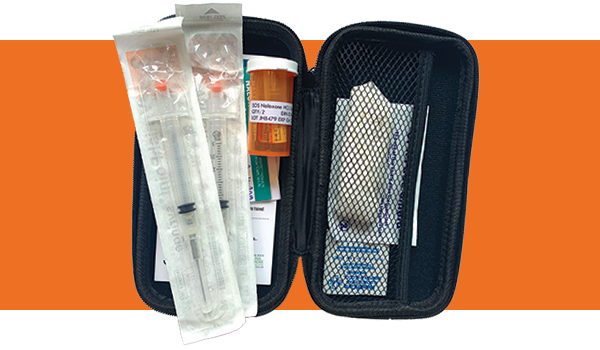T his year during orientation week, some Dalhousie nursing students, faculty and staff will be learning about Naloxone—a temporary antidote to opioid overdose—in a special workshop and training on September 5.
The program is led by Martha Paynter and Brianna Richardson, both PhD nursing students at Dalhousie, in partnership with Direction 180—a community-based methadone clinic in Halifax—and the Nova Scotia Take-Home Naloxone Program.
The course will cover the basics of recognizing an opioid overdose and administering Naloxone (also known as Narcan), plus more in-depth discussion of opioids themselves and approaching the opioid crisis from a harm reduction standpoint.
Paynter says that harm reduction isn't a significant part of nursing students' curriculum and that as a result, the training is not just about the skill of recognizing opioid overdose and administering Naloxone, but really about adopting harm reduction principles.
"The foundation of nursing is to prevent harm, that philosophy should be brought into all forms of nursing work," she says.
Megan Glover, a Nurse Practitioner masters student at Dalhousie, signed up for the course because her training so far hadn't exposed her to environments where Naloxone was being taught or used. As a nurse, she wanted to expand her own knowledge—especially since Naloxone can be life-saving—and to be able to identify for herself and help others identify the appropriate use of the drug.
Since 2017, Nova Scotia's Take-Home Naloxone Program has made Naloxone kits available to any Nova Scotian at all pharmacies in the province, and while the program has been widely praised, not all students—or even Haligonians—know about it.
The program is also focused on harm reduction principles and aims to combat opioid-related deaths in the province. As of August 1, there had been 33 confirmed or probable opioid-related deaths in 2019. In 2018 there were 56.
The basic training at pharmacies takes only five minutes, and is totally free.
Alex Hosein, a pharmacist at Scotia Pharmacy on Gottingen Street, says the pharmacy gives about one Naloxone training a week, but when the program was first announced they were doing around three or four.
The workshop at Dalhousie this month has unlimited spots. As more students sign up, they'll keep getting a larger space. Students can sign up at: http://bit.ly/324cPxH
Or, head to any pharmacy in the city to get the five-minute training and your own take-home kit.
Signs of an opioid overdose
- Person can’t be woken up
- Breathing is very slow, erratic or irregular or has stopped
- Deep snoring or gurgling sounds
- Fingernails or lips are blue or purple
- Body is very limp
- Pupils are very small

